The Best Ways to Integrate AI Assistants Into Team Workflows

AI assistants have become more than just clever add-ons—they’re now powerful tools that can transform how teams operate, communicate, and deliver outcomes. As organisations search for ways to increase efficiency without overwhelming staff, AI offers a practical path forward. Modern platforms like Solium AI, for example, are designed to integrate seamlessly into existing systems, making the transition into AI-assisted workflows smoother than ever.
Below, we explore the best ways teams can thoughtfully and strategically incorporate AI assistants into their daily operations.
Streamline Repetitive Administrative Tasks
AI assistants can take over repetitive, low-value tasks such as scheduling meetings, drafting routine emails, sorting inboxes, preparing basic reports, and managing reminders. This frees up team members to focus on higher-impact work.
Use AI to Support Research and Information Gathering
AI can rapidly search, summarise, and synthesise information from multiple sources—offering summaries, market insights, competitor comparisons, and clarification on technical topics.
Improve Communication and Knowledge Sharing
AI-driven communication tools can automatically document meeting notes, create knowledge bases, translate content, summarise discussions, and highlight key action items.
Strengthen Project Management and Workflow Coordination
AI tools can track project progress, identify bottlenecks, assign tasks, send reminders, and organise project boards—helping teams maintain visibility and accountability.
Enhance Customer Interactions and Service Delivery
AI can support customer-facing teams by drafting responses, categorising support requests, providing quick access to customer data, and suggesting solutions based on history.
Encourage a Culture of Co-Working Between Humans and AI
The most successful teams view AI as a partner. Encourage experimentation, training, customisation, and discussions about best practices to build AI literacy.
Ensure Ethical and Responsible Use of AI
Organisations should establish guidelines, maintain transparency, protect data privacy, review AI outputs, and remain compliant with regulations.
Integrating AI assistants isn’t about replacing people—it’s about empowering them
With platforms like Solium AI, businesses can streamline processes, improve clarity, and create a future-ready workplace.





